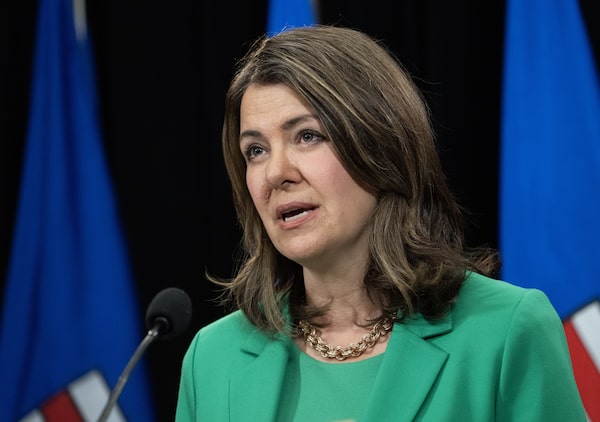
Alberta Premier Danielle Smith holds a news conference in Calgary on May 24.Todd Korol/The Canadian Press
In the lead-up to Alberta’s May election, United Conservative Party Premier Danielle Smith eagerly pointed to the government’s drug policy approach as the right one to address the opioid scourge roiling the country.
The UCP approach focuses on treatment and recovery, while rejecting safer supply and decriminalization (the latter approach is favoured by B.C.). As evidence of its efficacy, Ms. Smith pointed to Alberta’s drug crisis data for 2022, which showed overdose deaths in the province fell by 12 per cent, compared to just 1.5 per cent in B.C.
The Alberta government didn’t mention that drug overdose deaths generally fell across the country that year, a phenomenon largely associated with the pandemic being over. During it, pandemic-related measures were found to have exacerbated the unregulated drug crisis.
But Ms. Smith’s government was also not revealing what was happening in Alberta this year, in the lead-up to the election. Where were the monthly overdose numbers for 2023? Why were they being held back? Now we may know the answer – because the numbers are shocking and a poor reflection on the UCP government’s drug strategy.
April was the deadliest month on record for opioid overdoses in Alberta, with 179 people dying of drug poisoning. It’s the highest monthly toll since the province began tracking overdose fatalities in 2016. Drug-related deaths are up 6.4 per cent through the first four months of 2023 versus the same period last year.
The NDP Opposition claims Ms. Smith’s government concealed the latest data until after the election. Ms. Smith’s office is denying this. Ultimately, it doesn’t matter. What does matter is that people in the province are dying in record numbers, largely because of a toxic drug supply.
Any notion of the “Alberta model” being some kind of panacea for drug addiction should be dispensed of immediately. Yes, treatment and recovery are important aspects of an overall approach to the opioid epidemic, but so is safer supply, something the UCP has wrong-headedly rejected. In fact, supervised consumption sites have closed under their watch.
People are dying because of the deadly toxins in the drugs they are purchasing on the street, primarily fentanyl. Giving people who are addicted to drugs the option of untainted substitutes makes enormous sense. Even the Alberta Medical Association says that while treatment and recovery are good, “support is also needed for harm reduction, including safer supply – which is supported by growing evidence.”
But Ms. Smith has rejected this approach. So has federal Conservative Leader Pierre Poilievre. They believe they know better than the experts. What they really know is what some of their supporters think: that giving addicts “free drugs” is crazy. Better to just get them treated. Better to crack down on the sellers. Better to yank some addicts off the streets and force them into treatment if they refuse it.
Which is not an approach that anyone educated in this field subscribes to.
The drug crisis is a Canada-wide emergency, and it’s proving incredibly difficult to solve. Despite the most progressive and aggressive measures on this front, B.C. continues to see horrible fatality numbers. The death toll for illicit drug overdoses in B.C. this year surpassed 1,000 people by the end of May, making it the leading cause of death in the province for people between the ages of 10 and 59. Fentanyl was present in almost nine of 10 overdose results, according to B.C.’s Chief Coroner Lisa Lapointe.
Ben Perrin, a law professor at the University of B.C. who specializes in drug policy, believes safer supply is a vital tool in the fight against this menace. Right now, however, not enough people are able to access it.
“Prescribed safer supply only reaches around 5 per cent of the estimated 100,000 people in B.C. with opioid-use disorder,” Mr. Perrin told me in an e-mail. “At present, we do not have these harm reduction initiatives or on-demand evidence-based treatment in B.C. – or anywhere in Canada – scaled up adequately to sustain a significant reduction in unregulated drug deaths.”
That’s from someone who has been invested in studying this issue for years and who has authored an extremely important book on the issue – Overdose: Heartbreak and Hope in Canada’s Opioid Crisis. Maybe he might know a little more about this subject than an Alberta Premier who hosted a radio show on which she promoted some incredibly irresponsible and potentially dangerous health ideas. Or a federal leader who has been nothing but a politician his entire adult life.
Canada’s drug crisis is the country’s problem to solve. In this respect, we should be listening to our experts, and not politicians simply trying to score political points off the backs of some very sick people who desperately need our help.
 Gary Mason
Gary Mason